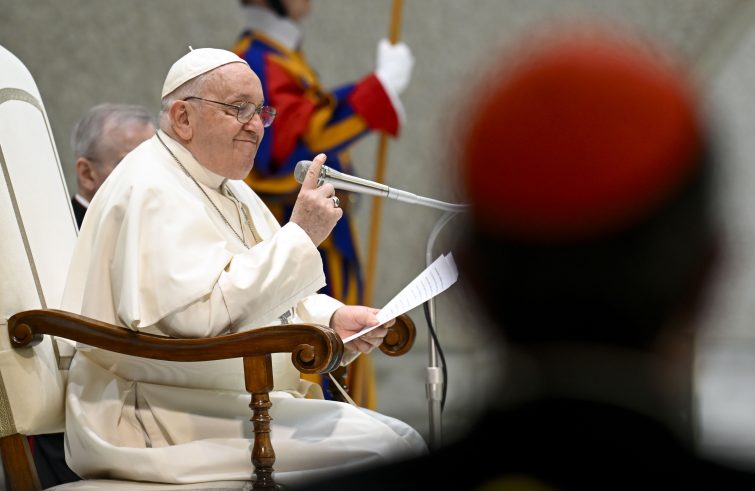
“To the dear Ukrainian people who are so sorely tried, and to those who are suffering the horrors of war in Palestine and Israel and in other parts of the world, we renew our closeness in prayer. Let us pray, let us pray for these people in the grip of war, and let us pray to the Lord to sow the seeds of peace in the hearts of national leaders.” Pope Francis renewed his plea for peace at the end of the traditional Wednesday general audience in Paul VI Hall, in his greetings to Italian-speaking faithful. “Tell me how you eat, and I will tell you what kind of soul you possess”, the Pope said during the catechesis, focusing on the theme of gluttony: the problem is not “the food in itself, but the relationship we have with it.”
“In all His ministry, Jesus appears as a prophet who is very distinct from the Baptist: while John is remembered for his asceticism – he ate what he found in the desert – Jesus is instead the Messiah whom we often see at the table”,
Francis said: “Let us look at Jesus. His first miracle, at the wedding at Cana, reveals His sympathy towards human joys: He is concerned that the feast should end well and gives the bride and groom a large quantity of very good wine.” “His behaviour causes scandal in some quarters, because not only is He benevolent towards sinners, but He even eats with them; and this gesture demonstrated His readiness for communion and closeness with everyone”, the Pope remarked: “But there is even more. Although Jesus’ attitude towards the Jewish precepts reveals His full submission to the Law, He nonetheless shows Himself to be sympathetic towards His disciples: when they are found wanting, because they pluck grain out of hunger, He justifies them, recalling that even King David and his companions took the sacred bread.” “And Jesus affirms a new principle”, Francis explained: “the wedding guests cannot fast when the bridegroom is with them. Jesus wants us to be joyful in His company – He is like the bridegroom of the Church; but He also wants us to participate in His sufferings, which are also the sufferings of the small and the poor. Jesus is universal.”
“Jesus eliminates the distinction between pure and impure foods, which was a distinction made by the Jewish law. And on this, Jesus says clearly that the bad thing about food, is not the food in itself but the relationship we have with it”,
the main theme of Wednesday’s general audience: “And we see this, when a person has a disordered relationship with food; we see how they eat, they eat hastily, as though with the urge to be full but without ever being sated.” Francis added in unscripted remarks: “they do not have a good relationship with food, they are slaves to food.” “Jesus values food and eating, also within society, where many imbalances and many pathologies manifest themselves”, Francis remarked: “One eats too much, or too little. Often one eats in solitude. Eating disorders – anorexia, bulimia, obesity – are spreading. And medicine and psychology are trying to tackle our poor relationship with food.” “A poor relationship with food produces all these illnesses, all of them”, the Pope continued off text: “They are illnesses, often extremely painful, that are mostly linked to sufferings of the psyche and the soul. There is a connection between psychological imbalance and the way food is consumed.” “This question is so important.
Tell me how you eat, and I will tell you what kind of soul you possess.”
“The way we eat is the manifestation of something inner”, Francis explained: “a predisposition to balance or immoderation; the capacity to give thanks or the arrogant presumption of autonomy; the empathy of those who share food with the needy, or the selfishness of those who hoard everything for themselves.” “In the way we eat, we reveal our inner selves, our habits, our psychological attitudes”, the Pope said, pointing out that “the ancient Fathers gave the vice of gluttony the name ‘gastrimargia’ – gastrimargy, a term that can be translated as ‘folly of the belly’”, the Pope remarked.
“Gluttony is a ‘folly of the belly’”, the Pope reiterated. He added in unscripted remarks: “There is also this proverb, that we should eat to live, not live to eat – “a folly of the belly”. It is a vice that latches onto one of our vital needs, such as eating. Let us beware of this.”
“If we interpret it from a social point of view, gluttony is perhaps the most dangerous vice, which is killing the planet”, he said: “Because the sin of those who succumb before a piece of cake, all things considered, does not cause great damage, but the voracity with which we have been plundering the goods of the planet for some centuries now is compromising the future of all”, the Pope denounced. “We have grabbed everything, in order to become the masters of all things, whereas everything had been consigned to our custody, not for us to exploit.” “Here, then, is the great sin, the fury of the belly is a great sin:
we have abjured the name of men, to assume another, consumers”,
he cautioned: “Today we speak like this in social life, consumers. We did not even notice when someone had started to give us this name. We were made in order to be “Eucharistic” men and women, capable of giving thanks, discreet in the use of the land, and instead the danger is that we turn into predators; and now we are realizing that this form of ‘gluttony’ has done a great deal of harm to the world”, the final recommendation: “Let us ask the Lord to help us on the road to sobriety, so that the many forms of gluttony do not take over our life.”











